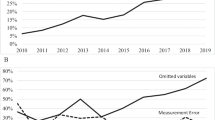Abstract.
The general case where the time specific effect in a two way model follows an arbitrary ARMA process has not been considered previously. We offer a straightforward maximum likelihood estimator for this case. Allowing for general ARMA processes raises the issue of model specification and we propose tests of the null hypothesis of no serial correlation as well as tests for discriminating between different specifications. A Monte-Carlo experiment evaluates the finite-sample properties of the estimators and test-statistics.
Similar content being viewed by others
Author information
Authors and Affiliations
Corresponding author
Additional information
We have benefitted from discussions with Pietro Balestra, Marc Nerlove and Peter Schmidt and comments from participants at the Ninth International Conference on Panel Data and the Econometric Society Eight World Congress. Financial support from HSFR, the Swedish Research Council for the Humanities and Soical Sciences is gratefully acknowledged.
Rights and permissions
About this article
Cite this article
Karlsson, S., Skoglund, J. Maximum-likelihood based inference in the two-way random effects model with serially correlated time effects. Empirical Economics 29, 79–88 (2004). https://doi.org/10.1007/s00181-003-0190-4
Issue Date:
DOI: https://doi.org/10.1007/s00181-003-0190-4




